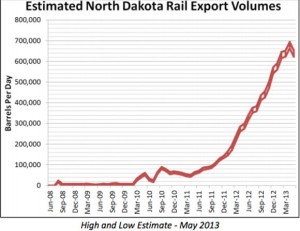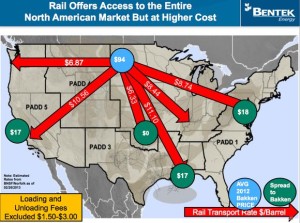Genscape is predicting that North Dakota's monthly Bakken production data will show an increase of 54,000 b/d June. The jump surpasses the record of 41,000 b/d set in February of this year and will drive North Dakota oil production above 860,000 b/d.
June will represent only the third time North Dakota production has increased more than 40,000 b/d in a single month (Jul 2011, Feb 2013, Jun 2013).
“Revised August 15, 2013: NDIC reports Bakken oil production grew a little more than 10,000 b/d from May to June.”
Read more in the article Bakken Oil Production Sets Record At More Than 750,000 b/d In June
May Was A Record Month In The Bakken Too
Production climbed to a record of more than 810,000 barrels per day in May even though it was the wettest month on record in the Bakken. The delays caused by weather primed June to be a good month for production.
Genscape estimates 70% of production moved by rail during the month and that North Dakota production will grow another 68,000 b/d to more than 920,000 b/d by year-end 2013.




